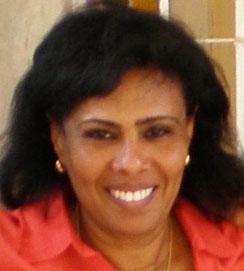Mahasin Osman, Msc. Ph.D.

Associate Professor
Departments of Medicine, Division of Oncology
College of Medicine and Life Sciences
Office BSH 352A
3000 Transverse Dr.
Toledo, OH 43614
Office: 419.383.4852
Lab: 419.383.4853
Email: Mahasin.Osman@utoledo.edu
Dr. Mahasin A. Osman is the founding PI and Director of the inaugural GRISE, T32 program at the University of Toledo titled “Training in Translational and Molecular Cell Dynamics”. She received her Ph.D. from Cornell University in Biochemistry Cell and Molecular Biology. Her postdoctoral work, also at Cornell, focused on cell polarity and cytokinesis and was the first to define the scaffold signaling regulator IQGAP1 as the widely used secretion marker in cytokinesis. Funded by the National Cancer Institute her laboratory identified a unique signaling pathway that couples cell growth and division and links cancer and several metabolic diseases.
Research in the Osman lab is both basic mechanistic and translational, focused on the mechanisms that govern cell homeostasis and their dysfunction in human disease. These mechanisms are produced by evolutionarily conserved multi-protein complexes involved in decoding, transmitting and executing intrinsic and extrinsic signals to regulate cell structure and function. Using cutting edge technology the Osman lab investigates signaling networks that underlie the link between cancer, diabetes and degenerative diseases, and aims at identifying novel diagnostic and therapeutic biomarkers for personalized medicine. In this regard she obtained a Patent Award US20210156864 A1, Titled Diagnostic and Therapeutic Biomarkers in Human Cancers and Methods of Use thereof
In addition, Dr. Osman serves as a scientific reviewer for several journals as well as national and international grants agencies, including the NIH, DoD, VA and AHA. Working through the American Society for Cell Biology (ASCB) International Affairs Committee and the UNDP she has been involved in training junior faculty and graduate students internationally, developing pertinent courses in cancer cell biology in developing African countries like Ghana, Tanzania, and Sudan, and in Turkey. She has organized several international conferences and workshops focusing on technology transfer and frontiers in biomedical sciences. Beside book chapters, she has published numerous frequently cited articles in high-impact peer reviewed journals, listing many of her undergraduate students as co-authors.


